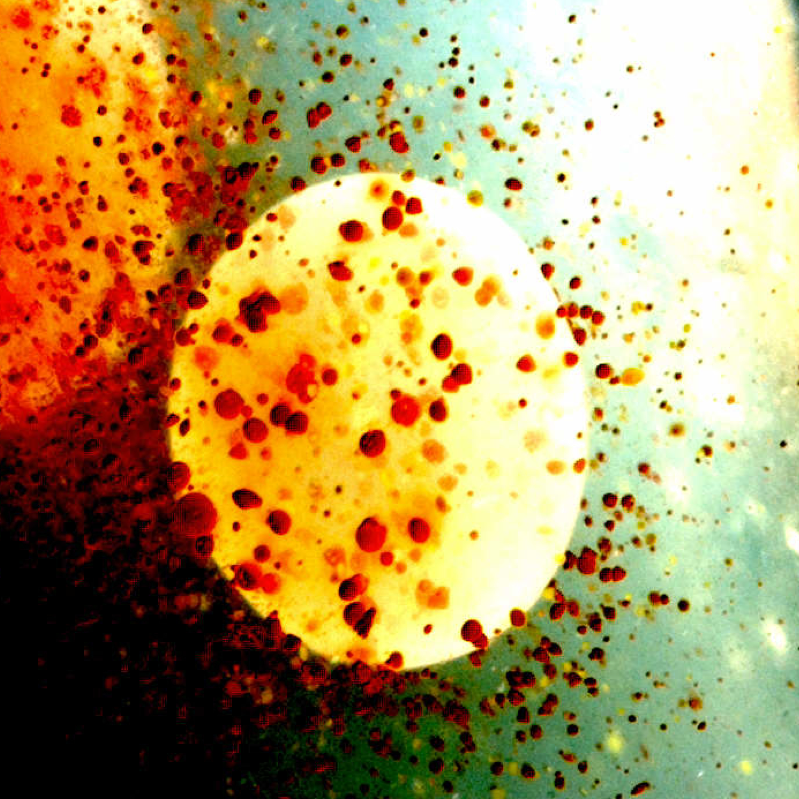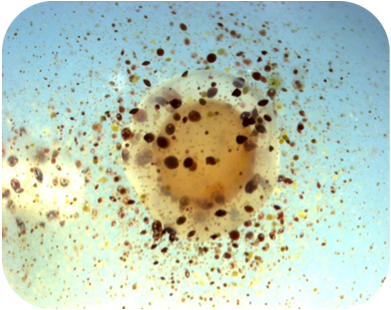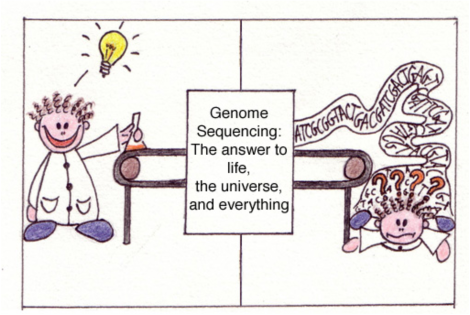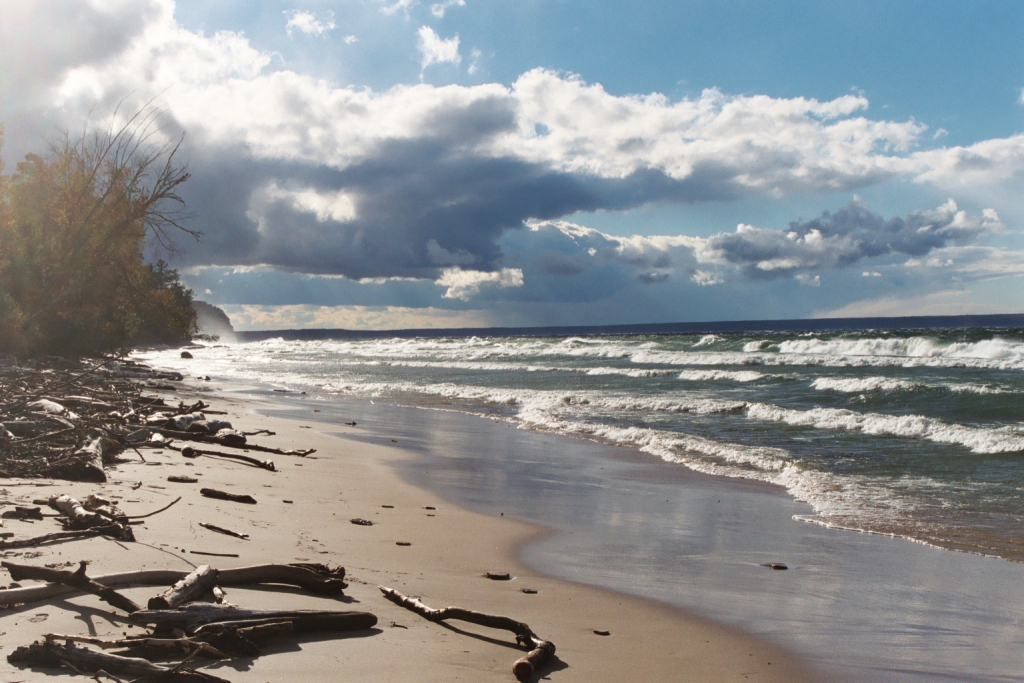|
Teaching
Fall 2019: BIO 207 - Microbiology
Image credit: Vincent Denef
Course objective/goals: The lectures describe the basic biology of microbial life, with emphasis on bacteria (Domain Bacteria and Domain Archaea) and information on eukaryotic microbes (protists, fungi, and unicellular algae) of Domain Eukarya. The lectures describe the basic biology of microbial life, with emphasis on bacteria (Domain Bacteria and Domain Archaea) and information on eukaryotic microbes (protists, fungi, and unicellular algae) of Domain Eukarya.
Lecture material in the course is divided into four approximately equal sections.
The first section examines the historical origins of microbiology as a science; bacterial and eukaryal cell structure and function, and bacterial nutrition, cultivation, and carbon and energy metabolism.
The second section addresses molecular biology of bacteria, including DNA replication, transcription and translation, regulation of gene expression, genomics, and bacterial viruses.
The third section of the course covers microbial evolution, metabolic and ecological diversity, nutrient cycles, and symbiotic interactions.
The final section of the course describes medically related topics, including host-pathogen interactions, epidemiology, immunology, and bacterial, viral, protozoan, and fungal pathogenesis.
Instructor: Prof. Vincent Denef (Department of Ecology and Evolutionary Biology)
Time/Location: Tue/Thu 4:00-5:30pm,
Website:
Prerequisites: BIOLOGY 171, (172 or 174), & 173; BIOLOGY 192 & 173; or BIOLOGY 195 & 173.
Required reading: Microbiology: An Evolving Science, Author: John W. Foster, Joan L. Slonczewski, Publisher: Norton, W. W. & Company, Inc. 4TH 2017
Laboratory: In addition to two one and a half hour lectures there is one three-hour laboratory session each week. The laboratory sessions are designed to guide the development of skill in fundamental aspects of microbiological work. It uses Benson's microbiological applications, laboratory manual in general microbiology, Author: Brown, Alfred E. (Emeritus professor of microbiology), Publisher: McGraw-Hill Education 2017
Winter 2020: EEB 446 - Microbial Ecology 
Course objective/goals: A greater focus on the microbial component of the biosphere is warranted, since “microbes run the world”(1). If we are to build comprehensive and predictive models for ecosystems important to environmental and human health, we need a better understanding of how microbial communities assemble and operate. This course will cover the ecology of microbes by highlighting their interactions with each other and the environment, and will present the latest insights into their role in ecosystems ranging from thawing permafrost to the human gastrointestinal tract. Ecological and evolutionary concepts and tools used in microbial research, including novel “omics” techniques, will be introduced. The course also aims at uncovering how concepts developed in plant and animal ecology do and do not translate to the microbial world. A greater focus on the microbial component of the biosphere is warranted, since “microbes run the world”(1). If we are to build comprehensive and predictive models for ecosystems important to environmental and human health, we need a better understanding of how microbial communities assemble and operate. This course will cover the ecology of microbes by highlighting their interactions with each other and the environment, and will present the latest insights into their role in ecosystems ranging from thawing permafrost to the human gastrointestinal tract. Ecological and evolutionary concepts and tools used in microbial research, including novel “omics” techniques, will be introduced. The course also aims at uncovering how concepts developed in plant and animal ecology do and do not translate to the microbial world.
Instructor: Prof. Vincent Denef (Department of Ecology and Evolutionary Biology)
Time/Location: Tue/Thu, 10-11:30am, 3733 CCRB
Website: ctools or LSA courseguide
Prerequisites: Introductory Microbiology (BIO 207 or the equivalent) and one 300 level biology course; Microbial diversity (EEB470) and general ecology (EEB281/381) are recommended.
Required reading: There is currently no comprehensive textbook available to support a microbial ecology class. Required readings include all papers posted on the course’s website and handouts. Additional readings will be distributed throughout the course.
Independent project: Part of the grade will be based on an independent project, carried out individually or in groups, depending on the class enrollment. Students will develop a concept from plant/animal ecology in the microbial field, written as a short research proposal, and presented during the last week of classes.
TBD: BIO 144 - Decoding your DNA: Implications for you and society
Image credit: Barbara Denef
Course objective/goals: Our DNA contains all the information we need to develop from a single cell into a hugely complicated human being. But how much of your “you-ness” is pre-determined by your DNA, the set of genes you received from your parents? How much do your experiences matter? Can we change our genes? And what are the implications if we do? Our DNA contains all the information we need to develop from a single cell into a hugely complicated human being. But how much of your “you-ness” is pre-determined by your DNA, the set of genes you received from your parents? How much do your experiences matter? Can we change our genes? And what are the implications if we do?
The beauty of cracking open the mysteries of our DNA is that it contains all the stories of our past, linking us to our ancestors, all the way to our species’ first beginnings, and some sidetracks to some other species somewhat less human. These stories have not remained the same over time, but have been rewritten and edited with each copy made. The story written in your DNA even changes during your lifetime.
Fueled by technological innovations, we are rapidly acquiring new knowledge regarding our genes. As a society, decisions are being made on how to use this information. But who makes these choices and what are the possible consequences? This course aims for non–science majors who will, like it or not, be affected by this knowledge revolution, to understand what the implications are of this new information and how it is used. We will also focus on what the implications are for the long-term trajectory of our species and society. From the impacts on the medical practice, which is moving towards human genome-based personalized medicine to ethical considerations regarding genetic discrimination, and from reflections regarding race and gender to the ways we can affect our fate by engineering the very genes that make you “you”.
Instructor: Prof. Vincent Denef (Department of Ecology and Evolutionary Biology)
Time/Location: Tue/Thu 10:00-11:30am,
Website:
Prerequisites: None
Required reading: Reading requirements include a very accessible book on human genes and a number of additional required readings from the popular scientific literature. Group-based documentary will be prepared during the semester and presented the last week (30% of grade). This project will allow students to actively investigate the implications of knowing and using genetic information for today’s world of medicine, ethics, policy, art, law, anthropology, journalism, etc.
Independent project: To enable a more active learning experience, 30% of this class’ credit will be based on a group-based short documentary, which the students will prepare throughout the semester and present during the last week of classes. This group project will allow students to actively investigate the impacts of genomics in today’s world of science, ethics, policy, art, law, anthropology, journalism, medicine, agriculture, etc. Students will be divided in groups of 4-5 and choose a field impacted by genomics and investigate the impact of genomics based on articles in the popular/scientific media, interviews with experts in the field, as well as with people not active in the field. The final product will be a 5-minute short documentary movie. While this will be a group project where all group members will be expected to contribute to all aspects of the project, each member of the group will take on a role that carries the responsibility for overseeing part of the project (literature research, screenplay writing and production, camera and editing, expert interviews, layman interviews).
|

